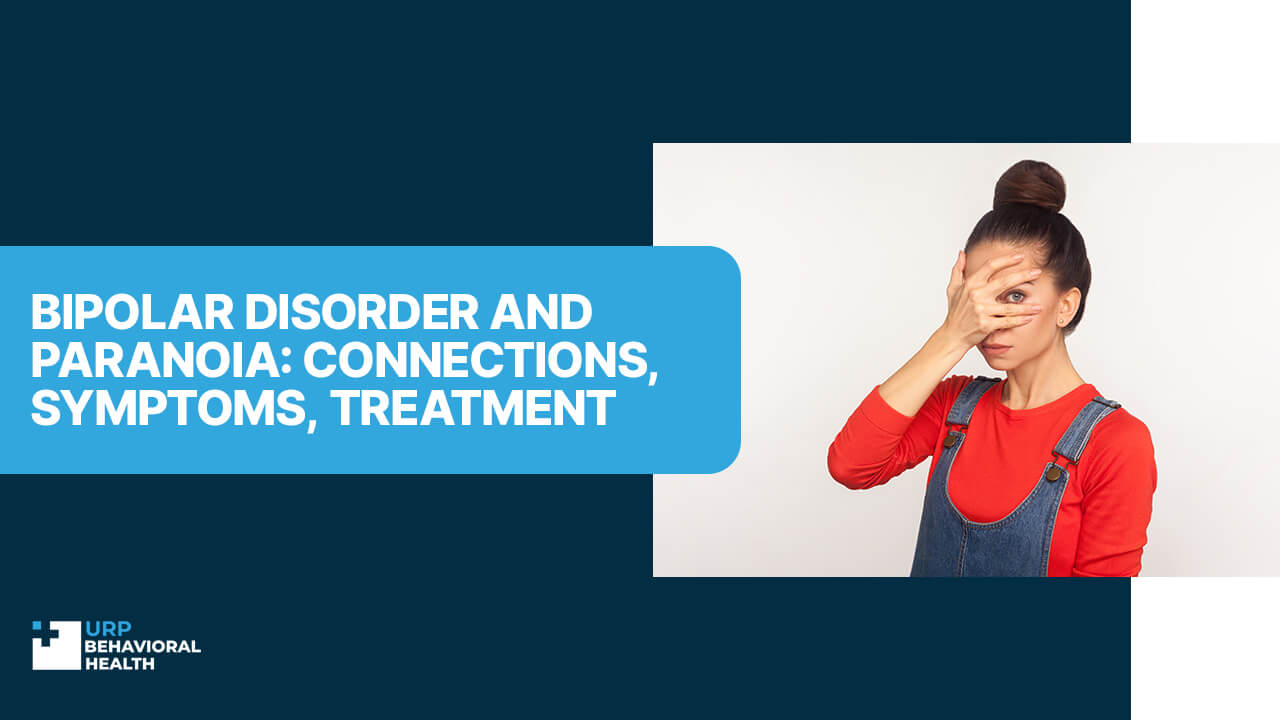
Bipolar Disorder and Paranoia: Connections, Symptoms, Treatment
Bipolar disorder, characterized by extreme mood swings, can sometimes include symptoms of paranoia, making the condition more complex and challenging to manage. Bipolar and paranoid thoughts are not uncommon together. This article explores how bipolar disorder and paranoia interact, their symptoms, and effective strategies for managing both conditions.
What is Paranoia?
Paranoia is an irrational and persistent feeling that people are ‘out to get you.’ It involves intense and unfounded mistrust or suspicion of others, often leading to feelings of persecution or belief that one is being watched or targeted. These feelings can be mild, moderate, or severe and may significantly impair an individual’s ability to function in daily life. The impact of paranoia on a person’s mental health and relationships can be profound, leading to isolation, depression, and difficulty maintaining daily routines.
Don’t wait - confidential help is available right now for you or your loved one.
Common Symptoms of Paranoia
The symptoms of paranoia can vary but generally include:
- Distrust and Suspicion: Constantly doubting the loyalty or intentions of others.
- Hypervigilance: Being overly aware and watchful of surroundings and behaviors.
- Misinterpretation of Events: Seeing hidden motives or threats in everyday interactions.
- Fear of Persecution: Believing that others are plotting against you.
- Difficulty Relaxing: Feeling constantly on edge and unable to let your guard down.
- Isolation: Withdrawing from social interactions due to fear and distrust [1].
These symptoms can severely impact a person’s quality of life, making it difficult to form and maintain relationships, perform at work, or engage in social activities. Paranoia can also lead to heightened stress and anxiety, further complicating mental health conditions like bipolar disorder.
Is Paranoia a Symptom of Bipolar Disorder?
Paranoia can be a symptom of bipolar disorder, particularly during severe manic or depressive episodes. In bipolar disorder, paranoia may present as part of psychotic features, which include delusions and hallucinations. These symptoms are more commonly associated with Bipolar I Disorder during intense mood episodes. However, they can also occur in Bipolar II Disorder during severe depressive states [2]. The presence of paranoia in bipolar disorder can complicate the diagnosis and treatment, as it may be mistaken for other psychiatric conditions such as schizophrenia or schizoaffective disorder.
Does Bipolar Disorder Cause Paranoia?
Bipolar disorder itself does not directly cause paranoia, but the intense mood swings associated with the condition can trigger paranoid thoughts. During manic episodes, individuals may experience heightened energy, grandiosity, and irritability, which can escalate into paranoia. Conversely, during depressive episodes, feelings of worthlessness and despair can manifest as paranoid thoughts and fears. Thus, while paranoia is not a standalone symptom of bipolar disorder, it can occur as a consequence of the severe mood disturbances associated with the condition [3]. This interconnectedness highlights the importance of comprehensive treatment approaches that address both mood regulation and paranoid thoughts.
What is Bipolar Disorder Paranoia Like?
Bipolar disorder paranoia is typically intense and distressing. During manic phases, individuals might believe they possess special powers or are part of significant conspiracies, leading to grandiose and paranoid delusions. In depressive phases, paranoia might revolve around feelings of persecution, believing that others are plotting against them or that they are being unfairly judged and mistreated. These paranoid delusions can severely impact relationships, work, and daily functioning, leading to isolation and further mental health issues [4]. The severity of paranoid thoughts can vary, but they often lead to significant distress and can interfere with the individual’s ability to think clearly or make rational decisions.
How Paranoia Affects Bipolar Symptoms?
Paranoia can significantly exacerbate the symptoms of bipolar disorder. The presence of paranoid thoughts can lead to increased anxiety, agitation, and hostility, making it harder to manage mood swings. It can also interfere with treatment adherence, as individuals may become suspicious of healthcare providers and the prescribed treatment plans. This combination can create a cycle where paranoia worsens mood instability, leading to more severe episodes and further paranoia [5]. For example, an individual may refuse to take medication or attend therapy sessions due to paranoid fears, leading to uncontrolled mood swings and further deterioration of their mental health.
Reach out today and let us create a treatment plan designed around your needs.
What are the Treatment Options for Bipolar Disorder Paranoia?
Treating bipolar disorder with paranoia requires a comprehensive and multi-faceted approach. While medication can be an essential component, this article focuses on non-pharmacological strategies. It is vital to consult with healthcare professionals to create a tailored treatment plan.
Psychotherapy
Psychotherapy is a cornerstone in managing bipolar disorder with paranoia. Cognitive Behavioral Therapy (CBT) can help individuals identify and challenge paranoid thoughts and develop healthier thinking patterns. Additionally, therapies like Dialectical Behavior Therapy (DBT) can teach coping strategies and emotional regulation techniques to manage intense mood swings and paranoia [6]. Family therapy can also be beneficial, providing support and education to family members, helping them understand the condition and how to support their loved one effectively.
Psychoeducation
Educating individuals and their families about bipolar disorder and paranoia is crucial. Understanding the nature of these conditions can help reduce fear and stigma, promote treatment adherence, and improve communication between the patient and their support network. Psychoeducation programs often include information on the symptoms and triggers of bipolar disorder and paranoia, strategies for managing stress, and the importance of a consistent treatment plan.
Lifestyle Modifications
Lifestyle changes can have a significant impact on managing bipolar disorder and paranoia. Regular exercise, a balanced diet, and maintaining a consistent sleep schedule can help stabilize mood and reduce stress. Mindfulness practices, such as meditation and yoga, can also help manage anxiety and paranoid thoughts [7]. Avoiding alcohol and recreational drugs, which can exacerbate symptoms, is also recommended.
Support Systems
Building a robust support system is essential for individuals with bipolar disorder and paranoia. This can include family, friends, support groups, and mental health professionals. A strong support system provides emotional support, practical assistance, and can help individuals adhere to their treatment plans. Engaging with others who have similar experiences can also provide valuable insights and coping strategies.
How Do You Defuse Bipolar Disorder Paranoia?
Defusing paranoia in individuals with bipolar disorder involves several strategies. First, creating a safe and supportive environment is crucial. This means being patient, avoiding confrontation, and offering reassurance. Communication should be clear and straightforward to avoid misunderstandings that could exacerbate paranoid thoughts.
Encouraging adherence to treatment plans is also vital. This includes attending therapy sessions, following prescribed routines, and engaging in healthy lifestyle habits. Developing coping strategies, such as mindfulness and relaxation techniques, can help manage stress and reduce the intensity of paranoid thoughts [8]. Educating individuals on the importance of early intervention and consistent treatment can prevent the escalation of symptoms.
Conclusion
The connection between bipolar disorder and paranoia is significant and complex. Understanding how these conditions interact and implementing effective strategies for management can greatly improve the quality of life for those affected. If you or someone you know is struggling with bipolar disorder and paranoia, seeking professional support is crucial. Early intervention and comprehensive treatment can help manage both conditions effectively, leading to better overall health and well-being. By addressing both the mood disturbances of bipolar disorder and the irrational fears of paranoia, individuals can achieve greater stability and improved mental health.
We’ll help you understand your options and guide you toward care.
Sources
- National Institute of Mental Health (NIMH). (2024). “Bipolar Disorder.” https://www.nimh.nih.gov/health/topics/bipolar-disorder
- American Psychiatric Association. (2024). “What Is Bipolar Disorder?” https://www.psychiatry.org/patients-families/bipolar-disorders/what-are-bipolar-disorders
- National Alliance on Mental Illness (NAMI). (2017). “Bipolar Disorder.” https://www.nami.org/About-Mental-Illness/Mental-Health-Conditions/Bipolar-Disorder
- Cerullo, M. A., & Strakowski, S. M. (2007). “The prevalence and significance of substance use disorders in bipolar type I and II disorder.” https://pubmed.ncbi.nlm.nih.gov/17908301/
- Bauer, M., & Whybrow, P. C. (2001). “Thyroid hormone, neural tissue, and mood modulation.” https://pubmed.ncbi.nlm.nih.gov/12587187/
- Miklowitz, D. J. (2002). “The Bipolar Disorder Survival Guide: What You and Your Family Need to Know.”
- Colom, F., & Vieta, E. (2006). “Psychoeducation Manual for Bipolar Disorder.”
















